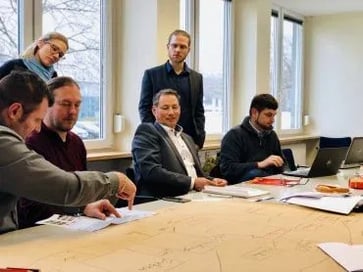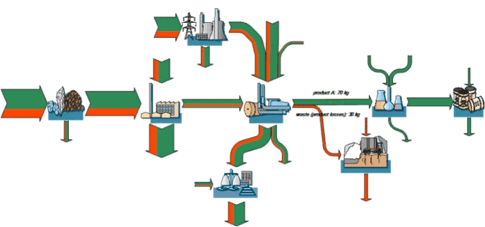Earlier this year, a team of consultants from ifu Hamburg, Member of iPoint Group, held an initial workshop at MinERALiX, a business specialized in the recycling of construction materials. The goal was to help the company gain more transparency in its material and energy flows and ultimately discover and fully utilize the efficiency potentials of recycling a broad spectrum of building materials.
Promoting material efficiency on a state-wide level
The workshop took place as part of the EFFIMA project, a program to promote material efficiency initiated by Umwelttechnik BW (Baden-Wuerttemberg State Agency for Environmental Technology). It is subsidized by the State of Baden-Wuerttemberg and supports businesses pursuing the following goals:
- utilizing material efficiency potentials
- lowering costs of production, storage, and waste management (i.e. increasing resource efficiency)
- producing a net positive impact on climate change
To implement the program, EFFIMA grants subsidies for professional consulting on material efficiency – which is how MinERALiX and ifu Hamburg were brought together in this workshop series.
Taking a closer look at the recycling industry
What does MinERALiX do, specifically? The mid-size company with several locations in the northern Baden region specializes in recycling, building materials, and environmental technology. The company’s name spells it out in German: Min for mineral compounds, E for Entsorgung (waste management), R for recycling, A for Aufbereitung (processing materials for reuse), and L for Lagerung (storage).
MinERALiX recycles a wide variety of mineral waste, from concrete rubble and construction waste to excavation material that would otherwise go to a land fill. The reclaimed materials can be reused in the building and construction industry. MinERALiX is part the Grötz group, which is involved in many different aspects of the construction industry.
Using MFCA to realize efficiency potentials in a future plant
The initial workshop at MinERALiX focused on the company’s projected new separation plant and the idea of using MFCA as a tool for optimizing the new facility during the planning stage. While MinERALiX had already worked out the flow diagrams showing how the new plant would operate, ifu Hamburg’s role was to apply its know-how and software to turn the diagram into a calculating model. In other words, the conceptual basis for the flow diagram had already been established – the goal was to enable quantification of the process and thus be able to look at different scenarios before construction begins.
“Usually, our consulting team is tasked with optimizing an existing process,” said Michael Hauke, one of the ifu Hamburg consultants leading the workshop. “This was different, as it specifically addressed a future development.” MinERALiX already had the data at hand, the question was if MFCA could be a suitable tool for such a project’s optimization.
Turns out, it is – and the key to success is bringing in a wide range of participants to assure that all efficiency potentials could be addressed.
Thinking holistically to reach greater material efficiency

There’s a lot of data involved in this project, from energy and material use to waste management and cost allocation. The cross-departmental circle of workshop participants reflected this holistic approach and included the CEO and the head of cost accounting for the Grötz group, as well as the various department heads and technical experts from MinERALiX responsible for planning the new facility.
“The initial workshop is important for both parties,” Michael Hauke explains. “We have to fully understand the overall system in order to develop a functional model with predictive abilities – and the company has to understand what sort of data input is required to reach a meaningful analysis.”
Key findings for increasing the efficiency potential in the recycling industry
During the introduction, Hauke presented a slide explaining the goals of MFCA. In it, various material flows were shown in green with red arrows to represent how much of a system’s costs and inputs end up as waste. When he announced the team’s intention to establish a similar flow chart for MinERALiX’s new plant during the 2-day workshop, it ignited the excitement to work towards the first results.

Nevertheless, they succeeded in developing a basic working model that helped to clarify several points. First, a focus on optimizing efficiency potentials during the planning phase of a new plant makes a lot of sense. Second, the process of sharing data and scrutinizing the plans with the ifu experts offered a new perspective to support MinERALiX employees in their decision making.
Among the issues raised were questions regarding the future plant’s size and workload capacity. When recycling waste material, the finer the grit size of the materials (rock, gravel, sand, etc.), the more energy input is required to get a re-usable product. When you reach the final mud stage, i.e., the finest grit fraction, it cannot be recycled anymore and is considered as waste, which generates removal costs.
The result: not every material can be profitably recycled. Being able to compare energy input and other costs of recycling versus the value of the recycled product is crucial to finding out which processes and materials are profitable for the recycling industry.
Next steps in on the path to increased efficiency
“In the end, we want to develop a model capable of analyzing a variety of scenarios,” says Tobias Steinert, another member of ifu Hamburg’s consulting team. This will allow MinERALiX to investigate different scenarios before even starting construction on the plant, such as looking at the advantages of a larger facility with more capacity. Identifying the bottlenecks within the recycling process and adapting the plant layout is a good idea – but when all is said and done, it’s the cost-benefit ratio that really counts.
The initial workshop at MinERALiX resulted in a working model that now has to be fine-tuned and then populated with more detailed data from the company. The result will be an intelligent tool which enables material flow cost accounting and support MinERALiX in utilizing the maximum efficiency potential for the new facility.





